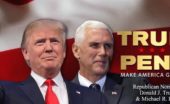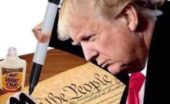Re Ian Bremmer 'Could third-party candidates upend the 2024 US election?' 3 April The current political movement in the USA…
U.S. government & governance 2012
Written by Diana Thebaud Nicholson // December 31, 2012 // Government & Governance, U.S. // 1 Comment
One thing we can count on with respect to this Congress is that if there is even one second left before you have to do what you’re supposed to do, they will use that last second. – President Obama
No Labels
Read the Label — The new political group No Labels shows why labels exist.
What does No Labels really want?
Salon talks to John Avlon, co-founder of the well-funded “centrist” advocacy group that launched earlier this week
Are Super PACs Harming U.S. Politics?
(U.S. News Debate Club) Proponents of super PACs argue that free speech is protected under the First Amendment, and they contend that it’s a fair system since candidates are not allowed to coordinate with them. Opponents disagree, and many are disturbed by predictions of upwards of $2 billion being spent by super PACs on the upcoming presidential election. They also hold that the non-coordination caveat is impossible to uphold and are upset by the proliferation of negative ads.
+++++++++
31 December
Obama’s “fiscal cliff” remarks leave GOP angry, confused
(CBS News) In the latest twist of the “fiscal cliff” saga, President Obama today seemingly spiked the football before crossing the goal line, applauding a deal that hasn’t been finalized and raising the ire of some Republicans who accused him of moving the goalposts. To top things off, he took the opportunity to rib Congress for their dysfunction – a curious move at a time when it’s their votes the president should be seeking, not their criticism.
U.S. goes over cliff: Deal close but no votes scheduled
(Politico) Washington inched closer to a deal that would avert massive tax increases, but Congress will still fall short of passing legislation before a new year deadline, sending the country over the fiscal cliff at least temporarily as the two sides struggled to iron out the final details of a high-stakes package.
The main holdup right now: Automatic spending cuts poised to kick in during the year, which the two parties have vowed to reverse but have failed to broker an agreement over how to do just that.
28 December
112th Congress Set To Become Most Unproductive Since 1940s
As 2012 comes to a close, the 112th Congress is set to go down in American history as the most unproductive session since the 1940s.
According to a Huffington Post review of all the bills that hit President Barack Obama’s desk this session, Obama has signed 219 bills passed by the 112th Congress into law. With less than a week to go in the year, there are currently another 20 bills pending presidential action. In comparison, the last Congress passed 383 bills, while the one before it passed 460.
The 104th Congress (1995-1996) currently holds the ignominious distinction of being the least productive session of Congress, according to the U.S. House Clerk’s Office, which has records going back to 1947. Just 333 bills became law during that two-year period, meaning the 112th Congress needs to send nearly 100 more bills to Obama’s desk in the next few days if it wants to avoid going down in history — an unlikely prospect, considering that both chambers are squarely focused on averting the “fiscal cliff” before the new year.
The 112th Congress has done far less than the 80th Congress (1947-1948), which President Harry Truman infamously dubbed the “Do-Nothing Congress.” Those lawmakers passed 906 bills that became law.
27 December
The Fiscal Cliff: Poll Shows Americans Blame Republicans More Than Democrats
(Reuters) – Americans blame Republicans in Congress more than congressional Democrats or President Barack Obama for the current “fiscal cliff” crisis, as the deadline approaches for action to avert big tax increases and spending cuts, a Reuters/Ipsos poll showed on Thursday.
When asked who they believed to be more responsible for the “fiscal cliff” situation, 27 percent blamed Republicans in Congress, 16 percent blamed Obama and 6 percent pointed to Democrats in Congress. The largest percentage – 31 percent – blamed “all of the above.”
24 December
David Bromwich: Chuck Hagel and the Trial-Balloon Method
(HuffPost) Chuck Hagel would make a superb secretary of defense. There is not another American of high reputation in public life who has proved himself so free of the disastrous illusions that led to the Global War on Terror. Is there any consolation in the loss, if it happens? Obama’s first choices for state and defense were Susan Rice and Hagel. The sickly trial-balloon method — so susceptible to the gradual buildup of an intimidating opposition — may end by sinking them both; yet they were contradictory choices in what they stood for: much harder to reconcile than, say, Robert Gates and Hillary Clinton. Rice is a careerist of the national security elite. Her only idiosyncrasy, if one can call it that, is excessive enthusiasm for “humanitarian intervention” and the remote-control wars that such enthusiasm breeds. Hagel, by contrast, is an independent thinker and a dissident, far more than the president himself: a man so alienated from the Republican war madness and other kinds of madness that he walked away from his party in 2008. A Kerry-Hagel team would have been interesting; but Obama’s original choice was the incoherent combination of Hagel and Rice.
In Barack Obama’s lexicon of prudential juggling, to go ahead and nominate Chuck Hagel now, after the opposition in the last two weeks has used the time it was given to grow, would be merely a “distraction” from the serious aims of his presidency. And in the playbook that is the constant guide of the maturity of Obama’s judgment, a distraction can never be allowed. Recall Obama’s expedient surrender of his early opposition to immunity of the telecoms from prosecution for illegal surveillance, and remember: that, too, was explained as a necessary avoidance of distractions in the 2008 campaign. Cap-and-trade legislation was pursued but ditched as a distraction in 2010. Work on nuclear proliferation was a hopeless distraction from 2009 through 2012 inclusive, and global warming, as the president has said, may be a catastrophe that is already upon us, but it is a secondary concern for most Americans now, and therefore may be filed away as a distraction in his second term. At best, global warming will be given the Commission Treatment and the slow boat to the next presidency.
15 December
John Boehner Proposes Millionaire Tax Hike In Exchange For Steep Entitlement Cuts
(HuffPost) Signaling new movement in “fiscal cliff” talks, House Speaker John Boehner has proposed raising the top rate for earners making more than $1 million, a person familiar with the negotiations said. President Barack Obama, who wants higher top rates for households earning more than $250,000, has not accepted the offer, this person said.
The proposal, however, indicated progress in talks that had appeared stalled.
Soured History Hampers Talks Between Obama and Boehner
(NYT) Unlike last year, when Mr. Obama and Mr. Boehner negotiated while looking toward the 2012 elections, they now meet knowing that in all likelihood they will be dealing with each other for the foreseeable future and that their legacies and the good of the country depend on constructive engagement.
“Neither one can afford to win an absolute victory over the other,” said one Republican lawmaker who is close to the speaker but did not want to be identified commenting on the delicate talks. “If you push him into a deal that costs him his speakership, the next guy up is not going to be to the left of John Boehner. And we don’t want a weak president.”
14 December
Rush Limbaugh: Liberals, mainstream media will blame GOP
(Politico) Rush Limbaugh said Friday that liberals and the mainstream media will look to blame the Newtown, Conn., elementary school shooting on Republicans and he added it was “sickening” some in the press were already pushing for more gun control.
25 November
Paul Rosenberg: A grand bargain is a grand betrayal: The forgotten, lonely world of facts
That the United States is centre-right and Obama must needs compromise on slashing the welfare state is a myth.
(Al Jazeera) In the world of stubborn and stupid, America is a centre-right nation, and it really does make no sense that Barack Obama beat Mitt Romney. He’s trying to compromise with the Republicans because he has to: Their insistence on slashing the welfare state represents the overwhelming consensus of American political opinion, regardless of the last election’s results. But in the forgotten, lonely world of facts, none of that is true.
… Robert L Borosage warned in a cover story for the Nation magazine, which cites some of these same strong views opposing what the fantasy rhetoric hides. “The grand bargain not only offers the wrong answer; it poses the wrong question,” Borosage writes. The right question, of course, is what to do about the stranglehold of wealth and income inequality that has developed over the past 30+ years, and how to secure the future of the 99 percent that have been left behind. “The call for shared sacrifice makes no sense,” Borosage argues, “given that in recent decades, the rewards have not been shared.”
A truly progressive vision, stubbornly rooted in the world of facts would focus like a laser beam on the right question. This is what FDR’s New Deal was all about at bottom – rebuilding the nation’s prosperity from the bottom up. The economic soundness of his approach can be seen in the decades of broadly shared prosperity that followed in his wake. The political soundness can be seen in the polling data cited above – particularly the measures of conservative support. Those are the stubborn facts that President Obama ought to be attending to. And leave the stubborn fantasies behind. It’s time he set aside his love affair with Ronald Reagan. John Adams is waiting in the wings.
“David [Jones] Versus David [Kilgour]” Yahoo Blog Forecasting President Obama’s Second Term
Jones: Obama’s second term: He must balance economics with international issues
Kilgour: Obama’s second term: Tackling economic woes must be his first priority
5 November
The Rise of 99Rise
(The Nation) The impact of the Supreme Court’s 2010 decision Citizens United v. the Federal Election Commission allowing unlimited and anonymous campaign spending has been profound and could yet be decisive in this election.
With an estimated $9.8 billion set to be spent during this electoral cycle, the 2012 elections will be the most expensive in history and have completely saturated the media and cultural environment in so-called swing states. As a result, according to the 99Rise.org, “One in four Americans say they are less likely to vote than in 2008, and 75 percent of Americans believe money buys results in Congress.
In response, 99Rise, a new grassroots group seeking to expose corporate spending in the most expensive election in United States history and get “big money out of politics” once and for all, has recently risen up. Coming out of the tradition of the Optor! movement in Serbia and the more recent Occupy protests in the US, 99Rise believes that strategic, nonviolent direct action is the only way to redress legislative loopholes that benefit profit over people.
While the 2012 elections have shaped our political climate in the past months, 99Risers are planning to continue nonviolent actions against banks well beyond the election, promising the kind of mass mobilization that Occupy Wall Street attempted in 2011. Our generation needs to learn from the model of organizing that acknowledges the success of direct action and legislative pressure working in tandem in order to build a broad movement and put ourselves on the line, strategically, when and where it really counts.
21 October
Super PACs
(OpenSecrets.org) Super PACs are a new kind of political action committee created in July 2010 following the outcome of a federal court case known as SpeechNow.org v. Federal Election Commission.
Technically known as independent expenditure-only committees, Super PACs may raise unlimited sums of money from corporations, unions, associations and individuals, then spend unlimited sums to overtly advocate for or against political candidates. Super PACs must, however, report their donors to the Federal Election Commission on a monthly or quarterly basis — the Super PAC’s choice — as a traditional PAC would. Unlike traditional PACs, Super PACs are prohibited from donating money directly to political candidates.
As of October 21, 2012, 946 groups organized as Super PACs have reported total receipts of $528,125,579 and total independent expenditures of $419,516,557 in the 2012 cycle.
4 October
Election 2012: top seven super PACs
(CSM DC Decoder) News organizations, public interest groups, and bloggers have covered super PACs extensively, especially in a bid to identify donors and their interests. Groups such as The Sunlight Foundation, The Center for Public Integrity, and the Center for Responsive Politics are tracking super PAC spending down to the dollar. The top 1 percent of donors (105 people) have contributed 58 percent of all super PAC funding, mainly directed to help conservatives.
Decoder has compiled a report on the seven top super PACs – the organizations that have spent the most and still have the most money in the bank – the candidates they support, and the donors behind them. Here is the bigger picture on the new groups funding this election.
17 July
How 17 people funded the Republican super PAC world — in one chart
That the rise of super PACs has given a small number of wealthy donors an outsized level of influence in our political discourse isn’t a secret.
After all, former House Speaker Newt Gingrich wouldn’t have even been in the Republican primary game if it wasn’t for a supportive super PAC funded by casino magnate Sheldon Adelson. And super PACs supportive of Mitt Romney have kept him within financial shouting distance of President Obama in critical swing states like Florida and Virginia.
Check out this awesome infographic that spells it all out. The most important point? In 2011, 17 people made contributions of $1 million or more to the nine biggest conservative super PACs. That $28 million in donations accounted for half, yes HALF, of all the money these groups collected.
14 July
Unshackling the Presidency to Fix the Government
(NYT) In all the discussion these days about how dysfunctional Washington has become, attention usually centers on a fractious Congress riven by partisanship and paralyzed at times by rules and obstruction. Often lost in that conversation is the possibility that the presidency itself may need fixing.
At least that is the conclusion of a bipartisan group of former advisers to presidents and would-be presidents who have drafted what they call a plan to make the presidency work better. With the help of several former White House chiefs of staff, the group, called No Labels, has fashioned a blueprint that would make whoever wins in November both more powerful and more accountable.
The idea is to cut through some of the institutional obstacles to decisive leadership that have challenged President Obama and his recent predecessors, while also erecting structures to foster more bipartisanship, transparency and responsiveness. If the proposals were enacted, the next president would have more latitude to reorganize the government, appoint his own team, reject special-interest measures and fast-track his own initiatives through Congress. But he would also be called on to interact more regularly with lawmakers, reporters and the public.
The plan is a follow-up to a similar blueprint from No Labels for making Congress work better.
The plan advances 11 proposals, some of them relatively minor but symbolically important and others fairly sweeping in scope. Many of them may be unlikely to be adopted, but the authors hope at least to prompt a debate about ways to address the dysfunction they see.
To build accountability, the plan calls on the next president to hold monthly news conferences and twice-a-year citizen news conferences; meet quarterly with the Congressional leadership of both parties; bill his political party for travel that involves fund-raising, rather than schedule extraneous official events so that taxpayers pick up part of the tab; and submit to 90-minute question-and-answer sessions each month on the floors of Congress, much as the British prime minister does in Parliament.
To build presidential power, the plan proposes that the next president be given expanded authority to send individual items in spending bills back to Congress for up-or-down votes. It also proposes renewing presidential power that lapsed in 1984 to consolidate and even eliminate parts of the federal government.
The next president would also have more freedom to appoint his administration, a process now widely considered broken.
…
Perhaps most provocative is a proposal to allow the president to send legislation to Congress twice a year that could not be amended but only approved or rejected. That is patterned after what is known as fast-track authority, often applied to trade agreements. By preventing lawmakers from changing such legislation, a president could get yes-or-no answers on his top priorities.
William A. Galston, an aide to President Bill Clinton who is now a senior fellow at the Brookings Institution, suggested that one possible subject of fast-track authority could be the bipartisan plan to reduce the deficit that was created by a presidential commission led by Alan K. Simpson, a former Republican senator from Wyoming, and Erskine B. Bowles, a White House chief of staff under Mr. Clinton. The Simpson-Bowles plan included a cornucopia of unpopular tax increases and spending cuts, but under this proposal Congress would have to accept or reject the whole plan.
Mark McKinnon, a Democratic media consultant who crossed lines to work for Mr. Bush’s campaigns and later helped found No Labels, said that the fast-track idea “would be a big game changer” by itself, but that the overall effect of the various proposals would go a long way toward restoring faith in the presidency.
29 May
PACs, Big Companies, Lobbyists, and Banks and Financial Institutions Seen by Strong Majorities as Having Too Much Power and Influence in DC
Small business and public opinion seen as having too little
(Harris Interactive) When one thinks about how Washington, D.C. works, certain groups are always seen as being too powerful and wielding too much influence whether in the halls of Congress or the White House. Almost nine in ten Americans say that political action committees or PACs (88%) and big companies (86%) have too much power and influence in Washington, D.C. More than four in five U.S. adults believe political lobbyists (85%), and banks and financial institutions (81%) carry too much influence inside the Beltway while almost three-quarters believe the news media (73%) has too much power.
These are some of the results of The Harris Poll of 1,016 adults surveyed by telephone between April 10 and 17, 2012 by Harris Interactive.




One Comment on "U.S. government & governance 2012"
Following the discussion around Hagel’s nomination makes one wonder whether he is being appointed to head the US Army or IDF.